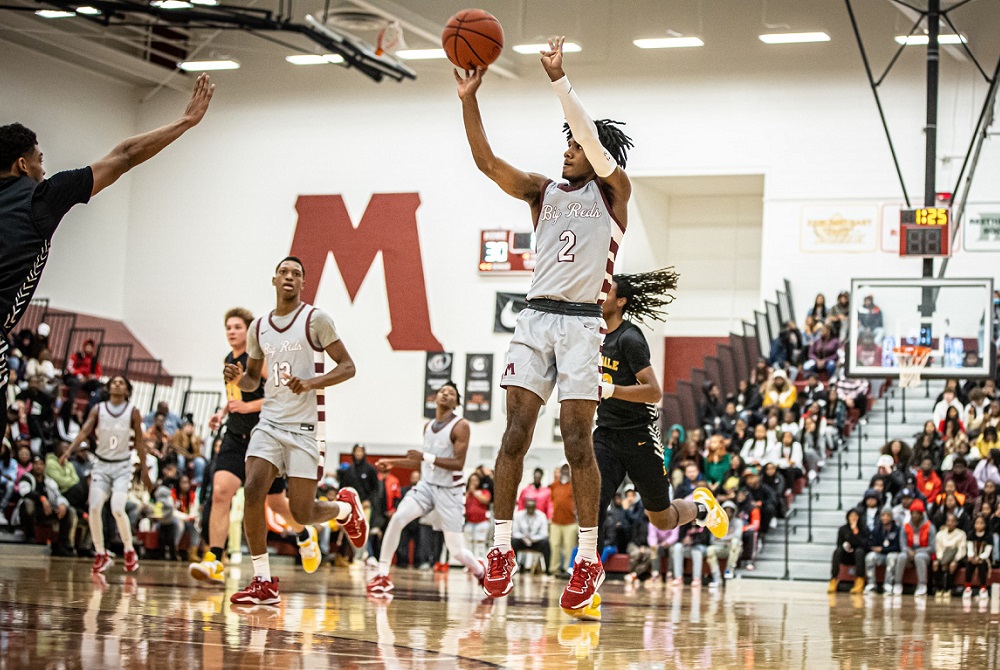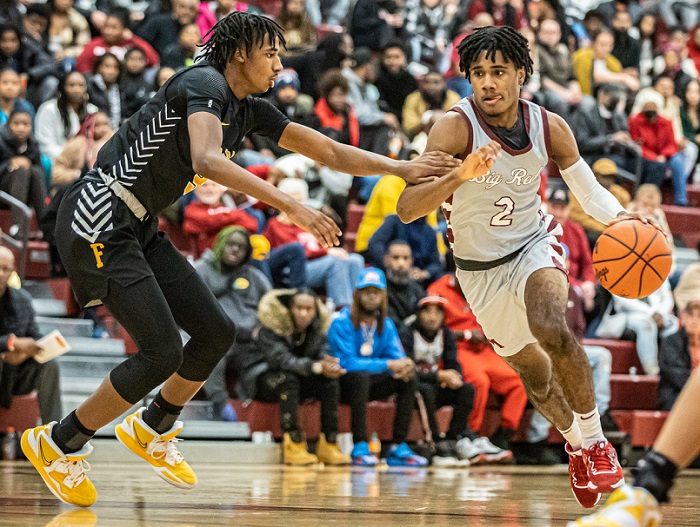
Detroit 'Longtime' Boys Coaches Down to Few
By
Tom Markowski
Special for Second Half
December 14, 2016
Gary Fralick considers himself one of the fortunate ones.
 Fralick, 66, is in his 32nd season as a head boys basketball coach. He retired from his teaching position in 2013. He started coaching at Redford Thurston in 1979, went to Royal Oak Kimball in 1984 and is in 23rd season as the head coach at Troy.
Fralick, 66, is in his 32nd season as a head boys basketball coach. He retired from his teaching position in 2013. He started coaching at Redford Thurston in 1979, went to Royal Oak Kimball in 1984 and is in 23rd season as the head coach at Troy.
Fralick might be lucky, but he is unquestionably rare. Fralick is believed to be one of three coaches in the Macomb/Oakland/Wayne area who has coached for more than 30 seasons.
There’s Dan Fife at Clarkston and Kevin Voss of Clinton Township Chippewa Valley, both of whom in their 35th seasons, all at the same school.
Another, Greg Esler at Warren DeLaSalle, is in his 30th season. He was the head coach at St. Clair Shores Lake Shore for seven seasons before going to DeLaSalle in 1994.
“We’re part of a dying breed,” Voss said.
It certainly appears so. Coaching longevity has taken on a different meaning recently. Twenty seems like a lot in these times, and in reality it is a long time. Twenty years or so ago, 20 years was normal. There’s a new normal, and 20 or 25 years isn’t it.
Many factors have contributed to this change. A person’s personal and family life often don’t coincide with the demands of coaching basketball. The responsibilities that come with coaching have increased. Some coaches say that to be an effective coach, it can be a 10- or 11-month job.
Two factors are at the forefront, and they are both financial. Coaches used to be educators as well as coaches. Yes, coaching can be viewed as teaching on the court, but at one time teaching in a classroom and coaching used to go hand in hand.
 Then there’s the subsidy coaches receive. It varies from school district to school district. Some make $4,000 a season, others can make $7,000. And it also costs money to run a program; unless the coach receives financial help from a booster club or parents, the money he or she receives begins to dwindle.
Then there’s the subsidy coaches receive. It varies from school district to school district. Some make $4,000 a season, others can make $7,000. And it also costs money to run a program; unless the coach receives financial help from a booster club or parents, the money he or she receives begins to dwindle.
But the most important factor is time.
“A tremendous amount of time is devoted to watching DVD or tapes,” Fralick said. “I know I’m dating myself with saying that. The point is, you’re watching a lot. There’s more scouting. And you don’t get paid much. Why don’t they stay as long as they used to? They get burned out. They want to spend more time with their families.
“You don’t see as many of the young coaches stay. Coaches don’t have the ambition to coach a long time. It’s not a profitable job. I don’t know what other coaches make. We used to compare what we made. Not anymore.
“Thirty years or more? I don’t see it happening. There’s the dual job thing. Things have changed. To me, it’s been a great job.”
To compensate for being away from home, Fralick brought his family with him. Sort of. He coached his son Gary, Jr., and Tim. Gary, a 1996 Troy graduate, played for his father his junior and senior seasons and Tim, a 1999 graduate, played four seasons on varsity. Fralick said he was even more fortunate to coach both on the same team (during the 1995-96 season).
Then there’s his wife, Sharon, who remains the scorekeeper.
“I’ve always had a passion for coaching and teaching,” Fralick said. “I love the game of basketball. I love the kids. There’s never a dull moment. It’s been a great ride.”
Vito Jordan has been around basketball all of his life. His father, Venias Jordan, was the boys head varsity coach at Detroit Mackenzie and Detroit Mumford before stepping down as a head coach only to return to the bench assisting his son the last six seasons.
Vito Jordan, 31, became a head coach at Detroit Osborn when he was 24. He started his coaching career the year before as an assistant to Henry Washington at Macomb College. Jordan went to Detroit Community after one season at Osborn and guided Community to its only MHSAA Finals appearance (Class B, 2013). He’s now in his fourth season as the head coach at Detroit Renaissance.
“I followed my father all of my life,” Jordan said. “I knew what I wanted to do when I was in college (Alma College). This is what I want to do the rest of my life.”
It’s different in Detroit. Schools close. Job titles change. Jordan, for instance, teaches at the Academy of Warren, a middle school in Detroit. It’s a charter school, not within the Detroit Public School system, therefore he receives his pay from two separate school systems (Renaissance is in the DPS).
There is a distinction. In some school systems coaches will receive a percentage – let’s say for argument sake, 10 percent – of their teaching salary to coach. Let’s say a person makes $60,000 a year to teach. He or she would then receive $6,000 to coach. If you coach two sports, that’s $12,000.
 Jordan is not privy to such a contract. Each job is separate. Jordan loves to coach, and he understands he must be a teacher to earn a decent living, and he’s content to continue on the path he is following. But he also knows that to make a good salary just coaching one must move on to the collegiate level like others have done.
Jordan is not privy to such a contract. Each job is separate. Jordan loves to coach, and he understands he must be a teacher to earn a decent living, and he’s content to continue on the path he is following. But he also knows that to make a good salary just coaching one must move on to the collegiate level like others have done.
“When there were coaches like my dad, Perry Watson (Detroit Southwestern), Johnny Goston (Detroit Pershing) and others, they all worked in the (Detroit Public) school system. Everyone was teaching. That was your career. None of them had aspirations of being a college coach. Not even Watson. Now everyone isn’t in the teaching profession. Maybe they do have a degree and maybe they don’t. The point is, most aren’t teachers. I can count on one hand those (in Detroit) who have their teaching certificate and coach.”
Jordan noted such successful PSL coaches like Derrick McDowell, Steve Hall and Robert Murphy who left high school to pursue a coaching career in college. Murphy guided Detroit Crockett to the Class B title in 2001 and is now the head coach at Eastern Michigan. McDowell has had two stints as a collegiate assistant coach, most recently at EMU. He’s since returned to coach at Detroit Western. Hall coached Detroit Rogers to three consecutive Class D titles (2003-05) before going to Duquesne University and Youngstown State as an assistant coach. Hall returned to Detroit last season and is in his second season as head coach at Detroit Cass Tech.
Jordan said they left high school to challenge themselves professionally, among other considerations. Voss said there are variables that influence how long a person lasts, in one school district or in coaching in general, that didn’t exist 20 years ago.
“Athletics have become pervasive in high school,” he said. “The whole booster situation you find in college is here. You can be winning but not winning enough. It’s a trickle down affect.
“Coaches complain about parents. Parents complain about playing time. High school sports is not as pure as it once was. Winning is way more important now. Now a coach comes in with a three-year window. You can have one or two down years, and the third you’d better win.
“Then there’s the pressure on your family. I’ve been lucky. My wife and I have had the players over for team dinners. We create a family atmosphere. It’s a change of society. I don’t envy the young coaches coming in.”
Community involvement has always been a priority for Voss. To keep a hand on the pulse, Voss heads the elementary basketball program within the Chippewa Valley school district. Games are held on Saturdays, and approximately 750 students take part.
“You have to have the right fit,” he said. “I’m in the right spot. You coach for different reasons when you get older. I’m enjoying the game. There’s a different level of satisfaction.”
 Tom Markowski is a columnist and directs website coverage for the State Champs! Sports Network. He previously covered primarily high school sports for the The Detroit News from 1984-2014, focusing on the Detroit area and contributing to statewide coverage of football and basketball. Contact him at [email protected] with story ideas for Oakland, Macomb and Wayne counties.
Tom Markowski is a columnist and directs website coverage for the State Champs! Sports Network. He previously covered primarily high school sports for the The Detroit News from 1984-2014, focusing on the Detroit area and contributing to statewide coverage of football and basketball. Contact him at [email protected] with story ideas for Oakland, Macomb and Wayne counties.
PHOTOS: (Top) Troy boys basketball coach Gary Fralick, left, is in his 32nd season coaching. (Middle) Detroit Renaissance boys coach Vito Jordan is following in the coaching footsteps of his father, Venias. (Below) Chippewa Valley boys coach Kevin Voss, left, is in his 35th season at his school. (Top and below photos courtesy of C&G Newspapers; middle photo courtesy of Detroit Public School League.)

Sweet-Shooting Briggs, Talented Teammates have Muskegon Dreaming Big Again
By
Tom Kendra
Special for MHSAA.com
January 10, 2023
Jordan Briggs put on another shooting clinic Saturday night in front of a packed house at Muskegon’s historic Redmond-Potter Gymnasium, repeatedly elevating and hitting 3-pointers and mid-range jumpers, making it look effortless.
 While the Muskegon senior has certainly been blessed with plenty of God-given ability, there is so much more to his story.
While the Muskegon senior has certainly been blessed with plenty of God-given ability, there is so much more to his story.
To fully understand Briggs’ emergence as one of the state’s best pure shooters, you had to be in the gym this summer when there was no crowd, no opposing team, no coaches and no media – just Briggs and the school’s shooting machine.
The only sounds on those days were the squeaks of his shoes echoing off the walls, followed up repeatedly by the swish of a leather ball through nylon. Five-hundred made shots every day. No exceptions. No excuses.
“I love to shoot,” said Briggs, a 6-foot-1 senior who scored a team-high 24 points Saturday to keep Muskegon undefeated with a 62-51 victory over Ferndale in the finale of the three-game Muskegon Basketball Showcase.
“I never get bored, and I could do it all day. That work I’ve put in gives me and my coaches confidence to take those shots in games. I pretty much have the green light.”
He’s not kidding.
Late in the first half Saturday, Briggs had the ball on a 2-on-1 fastbreak when he suddenly pulled up and fired a 3-pointer, which just rimmed out. Muskegon coach Keith Guy, who loves his team to constantly attack the rim, clapped his approval.
“Jordan is a pure shooter,” explained Guy, whose team is 5-0 and 1-0 in the Ottawa-Kent Conference Green. “But he’s also crafty with the basketball. He can get other guys involved and he’s got it on a string, so that’s a nightmare for other teams.
“A lot of great shooters can’t hurt you off the dribble, but he can do both.”
 Muskegon’s win Saturday was the 400th career victory for Guy as a head coach – with 191 in nine years at Muskegon Heights and 209 wins in 11 years at Muskegon.
Muskegon’s win Saturday was the 400th career victory for Guy as a head coach – with 191 in nine years at Muskegon Heights and 209 wins in 11 years at Muskegon.
Guy, whose tenure at Muskegon is highlighted by a Class A title in 2014 and two Mr. Basketball winners in DeShaun Thrower (2014) and Deyonta Davis (2015), has another team with the makings of a championship run and another Mr. Basketball candidate in Briggs.
Muskegon features two floor general-type point guards in senior David Day III and junior M’Khi Guy, along with a loaded front court with seven players standing 6-4 or taller, led by starting juniors Terrance Davis (6-6) and Stanley Cunningham (6-5).
A pure shooter like Briggs – a three-year starter who has committed to Wayne State – is something that Guy hasn’t always had, and might be what makes the difference in March.
Briggs had his best game of the season back on Dec. 28 at the Muskegon Area Sports Hall of Fame Classic at Reeths-Puffer High School. Michigan State coach Tom Izzo was there to get a close look at recruiting target Durral Brooks of Grand Rapids Catholic Central, but it was Briggs who stole the show.
Briggs scored a game-high 35 points, including the winning bucket in overtime in an 81-79 victory.
“I just happened to catch fire that night,” said Briggs, who is a 4.0-GPA student and a National Honor Society member. “That was a great win for us and we’re rolling to start the season, which is great. But we want to keep it going and play our best basketball in March, when it really counts.”
In the Big Reds’ first league game Friday night at cross-town rival Muskegon Reeths-Puffer, Briggs got in foul trouble and didn’t score in the first half. He made amends by scoring his team’s first 12 points of the second half (on four 3-pointers), as Muskegon pulled away for a 51-26 victory.
He followed that up with his 24-point performance against Ferndale and is now averaging 24 points, six rebounds and five assists per game.
Guy hopes that, led by Briggs, this year’s team is ready for a long run – literally.
Guy made all of his varsity players that were not on the football team run cross country this fall, and not just for conditioning reasons.
“It put them out of their comfort zones, which is a good thing,” explained Guy, who is also Muskegon’s athletic director. “Take Jordan, for example. Basketball is comfortable for him. I wanted to put him in situations that weren’t as comfortable for him so that he would learn how to adapt and handle being uncomfortable a little better.”
 Tom Kendra worked 23 years at The Muskegon Chronicle, including five as assistant sports editor and the final six as sports editor through 2011. E-mail him at [email protected] with story ideas for Muskegon, Oceana, Mason, Lake, Oceola, Mecosta and Newaygo counties.
Tom Kendra worked 23 years at The Muskegon Chronicle, including five as assistant sports editor and the final six as sports editor through 2011. E-mail him at [email protected] with story ideas for Muskegon, Oceana, Mason, Lake, Oceola, Mecosta and Newaygo counties.
PHOTOS (Top) Muskegon’s Jordan Briggs (2) pulls up for a shot at the 3-point arc during his team’s win Saturday over Ferndale. (Middle) Briggs makes his move toward the basket. (Photos by Tim Reilly.)

